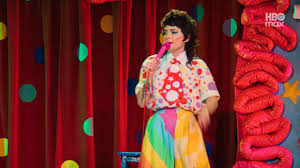Wicked Little Letters 2023 Movie Review
Before social media, you had to troll people the old-fashioned way: poison-pen letters. The new period comedy “Wicked Little Letters” follows just one such incident, chronicling one of the most notorious cases of trolling in British history. The film, directed by Thea Sharrock, is a playfully raunchy story about women behaving badly to break out of their conservative feminine roles.
Based on true events, “Wicked Little Letters” tells the story of two women who couldn’t be more different and scandal that linked them in 1920s England. Edith Swan (Olivia Colman) is an unmarried woman living with her domineering father Edward (Timothy Spall) and her gentle, meek mother Victoria (Gemma Jones) in a close-knit English village. But just right next door is her polar opposite, young Irish mother Rose Gooding (Jesse Buckley). After the death of her husband, Rose brought her daughter Nancy (Alisha Weir) and new love Bill (Malachi Kirby) to the small town to start a proper family. But Rose is also somewhat a good-time girl, drinking and cussing with all the men.
In flashback, we see that Edith tried to take Rose under her wing when the locals began to talk, but somewhere along the way, things went sour between the two of them. In the present day, Edith has received 19 poison pen letters, which she believes were written by Rose. The community sides with Edith — as she is a God-fearing woman — and urges the police to make Rose answer for her crimes. And their rift isn’t the only reason for Edith to suspect Rose. The letters themselves mainly contain crass, sexually explicit insults with an array of curse words arranged inventively. And since Rose is the woman in town who uses the most colorful language, it seems more than likely that it’s her.
But there’s one officer who doesn’t believe Rose is the culprit. Officer Gladys Moss (Anjana Vasan) is the only policewoman in town and Rose’s main ally, despite her resistance to that title. Despite her keen eye and sharp deduction skills, her fellow officers forbid her from tampering with the case. Not taking no for an answer, Gladys takes off on her own, trying to solve the mystery before Rose is sentenced and separated from her daughter. Perhaps, deep down, she sees Rose as a kindred spirit. They’re both women bucking against the conventions of the time, even if they may be on opposite sides of the law.
“Wicked Little Letters” is mainly concerned with gender roles and the punishment women face for not adhering to a narrow idea of what it means to be a woman. Rose is constantly telling Nancy that playing the guitar isn’t for young ladies, just as the community denounces her behavior as well. Behind closed doors, Edith receives the same treatment from her conservative father, who believes his daughter’s place is to look after him and have no life or her own. In keeping with the times, her mother never stands up for her. Edith lives her life under the weight of repression, smiling to mask all her simmering rage. She watches Rose with envy as she continues to live her life freely, despite the looming threat of prison.
The film’s screenplay, written by Jonny Sweet, hammers the point home many times. The men in the film are either bumbling or domineering, while the women in the film increasingly exercise their agency. More women get pulled into the mystery of the letters, inquiring with more curiosity than their male counterparts. Eileen Atkins, Joanna Scanlan, and Lolly Adefope round out the cast as local women who become embroiled in the mystery.
Before social media, you had to troll people the old-fashioned way: poison-pen letters. The new period comedy “Wicked Little Letters” follows just one such incident, chronicling one of the most notorious cases of trolling in British history. The film, directed by Thea Sharrock, is a playfully raunchy story about women behaving badly to break out of their conservative feminine roles.
Based on true events, “Wicked Little Letters” tells the story of two women who couldn’t be more different and scandal that linked them in 1920s England. Edith Swan (Olivia Colman) is an unmarried woman living with her domineering father Edward (Timothy Spall) and her gentle, meek mother Victoria (Gemma Jones) in a close-knit English village. But just right next door is her polar opposite, young Irish mother Rose Gooding (Jesse Buckley). After the death of her husband, Rose brought her daughter Nancy (Alisha Weir) and new love Bill (Malachi Kirby) to the small town to start a proper family. But Rose is also somewhat a good-time girl, drinking and cussing with all the men.
In flashback, we see that Edith tried to take Rose under her wing when the locals began to talk, but somewhere along the way, things went sour between the two of them. In the present day, Edith has received 19 poison pen letters, which she believes were written by Rose. The community sides with Edith — as she is a God-fearing woman — and urges the police to make Rose answer for her crimes. And their rift isn’t the only reason for Edith to suspect Rose. The letters themselves mainly contain crass, sexually explicit insults with an array of curse words arranged inventively. And since Rose is the woman in town who uses the most colorful language, it seems more than likely that it’s her.
But there’s one officer who doesn’t believe Rose is the culprit. Officer Gladys Moss (Anjana Vasan) is the only policewoman in town and Rose’s main ally, despite her resistance to that title. Despite her keen eye and sharp deduction skills, her fellow officers forbid her from tampering with the case. Not taking no for an answer, Gladys takes off on her own, trying to solve the mystery before Rose is sentenced and separated from her daughter. Perhaps, deep down, she sees Rose as a kindred spirit. They’re both women bucking against the conventions of the time, even if they may be on opposite sides of the law.
“Wicked Little Letters” is mainly concerned with gender roles and the punishment women face for not adhering to a narrow idea of what it means to be a woman. Rose is constantly telling Nancy that playing the guitar isn’t for young ladies, just as the community denounces her behavior as well. Behind closed doors, Edith receives the same treatment from her conservative father, who believes his daughter’s place is to look after him and have no life or her own. In keeping with the times, her mother never stands up for her. Edith lives her life under the weight of repression, smiling to mask all her simmering rage. She watches Rose with envy as she continues to live her life freely, despite the looming threat of prison.
The film’s screenplay, written by Jonny Sweet, hammers the point home many times. The men in the film are either bumbling or domineering, while the women in the film increasingly exercise their agency. More women get pulled into the mystery of the letters, inquiring with more curiosity than their male counterparts. Eileen Atkins, Joanna Scanlan, and Lolly Adefope round out the cast as local women who become embroiled in the mystery.
Despite that seemingly staid plot, “Wicked Little Letters” often plays like an extended comedy sketch with little interest in reality. As the film progresses, dirty words become more plentiful as the women begin to break loose from the bonds of propriety. The film adopts an irreverent tone as most of the actors are all but winking at the camera. Buckley and Colman play Rose and Edith with gleeful energy. Everyone seems to know they’re in a movie and it feels like they could break character at any moment. There’s a knowingness to Edith’s smiles. Even when alone, she seems to know she’s being watched.
As the film’s themes announce themselves again and again, it weakens the mystery. The film seems to be yelling at us who the culprit is while hoping we remain engaged by mugging and hijinks alone. Even comedies can (and should) have stakes, and “Wicked Little Letters” could stand to address that very idea, perhaps a bit more in tone rather than dialogue. Ultimately, we know everyone is having such great a time, that it almost doesn’t matter that everything feels inconsequential — even when something wicked really is afoot.




